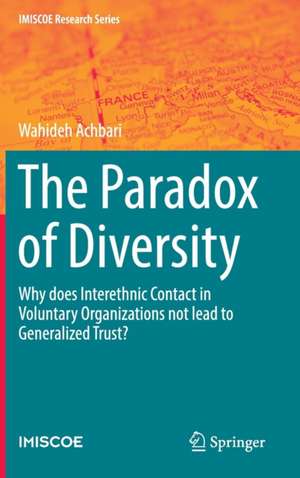The Paradox of Diversity: Why does Interethnic Contact in Voluntary Organizations not lead to Generalized Trust?: IMISCOE Research Series
Autor Wahideh Achbarien Limba Engleză Hardback – 19 sep 2016
| Toate formatele și edițiile | Preț | Express |
|---|---|---|
| Paperback (1) | 577.22 lei 6-8 săpt. | |
| Springer International Publishing – 22 apr 2018 | 577.22 lei 6-8 săpt. | |
| Hardback (1) | 583.45 lei 6-8 săpt. | |
| Springer International Publishing – 19 sep 2016 | 583.45 lei 6-8 săpt. |
Din seria IMISCOE Research Series
-
 Preț: 228.70 lei
Preț: 228.70 lei -
 Preț: 279.98 lei
Preț: 279.98 lei -
 Preț: 422.90 lei
Preț: 422.90 lei -
 Preț: 279.62 lei
Preț: 279.62 lei -
 Preț: 451.76 lei
Preț: 451.76 lei -
 Preț: 179.42 lei
Preț: 179.42 lei -
 Preț: 424.81 lei
Preț: 424.81 lei -
 Preț: 438.26 lei
Preț: 438.26 lei -
 Preț: 280.27 lei
Preț: 280.27 lei -
 Preț: 132.95 lei
Preț: 132.95 lei -
 Preț: 281.15 lei
Preț: 281.15 lei -
 Preț: 266.19 lei
Preț: 266.19 lei -
 Preț: 359.43 lei
Preț: 359.43 lei -
 Preț: 231.66 lei
Preț: 231.66 lei -
 Preț: 436.35 lei
Preț: 436.35 lei -
 Preț: 434.44 lei
Preț: 434.44 lei - 15%
 Preț: 700.75 lei
Preț: 700.75 lei -
 Preț: 424.43 lei
Preț: 424.43 lei -
 Preț: 425.20 lei
Preț: 425.20 lei -
 Preț: 429.83 lei
Preț: 429.83 lei -
 Preț: 425.58 lei
Preț: 425.58 lei -
 Preț: 429.61 lei
Preț: 429.61 lei -
 Preț: 424.43 lei
Preț: 424.43 lei -
 Preț: 426.18 lei
Preț: 426.18 lei -
 Preț: 420.79 lei
Preț: 420.79 lei -
 Preț: 426.94 lei
Preț: 426.94 lei -
 Preț: 429.61 lei
Preț: 429.61 lei -
 Preț: 425.42 lei
Preț: 425.42 lei - 15%
 Preț: 636.45 lei
Preț: 636.45 lei -
 Preț: 426.18 lei
Preț: 426.18 lei -
 Preț: 424.99 lei
Preț: 424.99 lei -
 Preț: 430.21 lei
Preț: 430.21 lei -
 Preț: 423.84 lei
Preț: 423.84 lei -
 Preț: 427.71 lei
Preț: 427.71 lei -
 Preț: 427.71 lei
Preț: 427.71 lei -
 Preț: 433.85 lei
Preț: 433.85 lei -
 Preț: 430.79 lei
Preț: 430.79 lei -
 Preț: 424.43 lei
Preț: 424.43 lei -
 Preț: 426.56 lei
Preț: 426.56 lei -
 Preț: 427.71 lei
Preț: 427.71 lei - 15%
 Preț: 528.13 lei
Preț: 528.13 lei
Preț: 583.45 lei
Preț vechi: 686.42 lei
-15% Nou
Puncte Express: 875
Preț estimativ în valută:
111.64€ • 116.98$ • 92.29£
111.64€ • 116.98$ • 92.29£
Carte tipărită la comandă
Livrare economică 11-25 aprilie
Preluare comenzi: 021 569.72.76
Specificații
ISBN-13: 9783319442419
ISBN-10: 3319442414
Pagini: 159
Ilustrații: XIV, 145 p. 23 illus.
Dimensiuni: 155 x 235 x 11 mm
Greutate: 0.4 kg
Ediția:1st ed. 2016
Editura: Springer International Publishing
Colecția Springer
Seria IMISCOE Research Series
Locul publicării:Cham, Switzerland
ISBN-10: 3319442414
Pagini: 159
Ilustrații: XIV, 145 p. 23 illus.
Dimensiuni: 155 x 235 x 11 mm
Greutate: 0.4 kg
Ediția:1st ed. 2016
Editura: Springer International Publishing
Colecția Springer
Seria IMISCOE Research Series
Locul publicării:Cham, Switzerland
Cuprins
Chapter 1: Introduction: Why this book? .- Chapter 2: Bridging versus Bonding Practices: Setting the Context.- Chapter 3: Generalized Trust: Socialization through Interethnic Contact?.- Chapter 4: Who Can Afford to Evaluate Strangers as Trustworthy?.- Chapter 5: Discussion and Conclusion: The Promise of Social Success.
Textul de pe ultima copertă
This book is about ethnic diversity in voluntary organizations and seeks to explain whether intergroup contact contributes to the development of generalized trust. It relies on a novel multilevel design and data from Amsterdam in which 40 voluntary organizations and 463 participants have been sampled. Contrary to conventional wisdom, this book argues that cognitive processes are contributing more toward the evaluation of strangers or generalized trust than interethnic contact. Since trusting unknown people is essentially a risky endeavor, this suggests that participants of both association types who report trusting strangers can afford to do so, because they are better educated, have a more positive worldview, and have had fewer negative life experiences. That is to say, they are socially more successful and view their future as more promising. Previous findings are inconclusive since most studies that conclude diversity has led to less generalized trust do not include interethnic contact directly in their analyses. These studies also downplay the importance of cognitive processes, which may shape generalized trust. What is more, people join ethnically diverse civic groups, because they already have more trustful attitudes, rather than learning to trust through interethnic contact. Despite the recent multiculturalist backlash, this book demonstrates that participation in ethno-national organizations does not pose a threat to social cohesion. The analysis in this book serves to build a general theory of trust that moves beyond emphasizing interaction between people who are different from each other, but one that includes the importance of cognition.
Caracteristici
Argues that cognitive processes contribute towards the evaluation of unknown people Investigates interethnic contact in voluntary organizations Demonstrates that participation in ethno-national organizations is not posing a threat to social cohesion Includes supplementary material: sn.pub/extras











